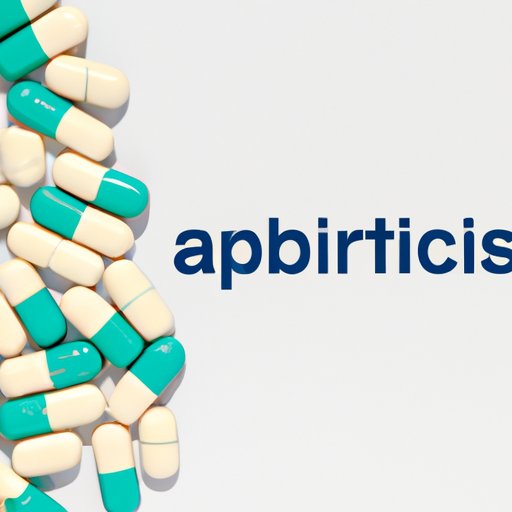Can You Take Antibiotics Whilst Pregnant? What You Need to Know
Being pregnant means being extra cautious about everything you eat, drink, and take, including medication. However, sometimes, infections cannot wait for the baby to be born before getting treated. Antibiotics can be lifesaving in such cases, but it’s important to weigh the benefits against the risks. This article aims to provide a holistic view of the topic so that expectant mothers can make informed decisions.
Antibiotics During Pregnancy: What You Need to Know
Antibiotics are powerful drugs used to treat bacterial infections. They either kill the bacteria or stop their growth. Penicillin, erythromycin, and cephalexin are some common antibiotics.
During pregnancy, women are more susceptible to infections due to changes in their immune system. Pregnancy hormones also make it easier for bacteria to multiply, making infections more likely. Infections can also lead to complications like premature births and low birth weight. Hence, there are times when pregnant women need antibiotics.
The Risks and Benefits of Taking Antibiotics While Pregnant
The benefits of antibiotics during pregnancy cannot be overstated. They can effectively treat infections and prevent their spread. For instance, untreated UTIs can lead to kidney infections, which can harm the baby. Similarly, chorioamnionitis, an infection of the amniotic fluid and membranes, can lead to preterm labor, sepsis, and stillbirth.
However, antibiotics also come with risks during pregnancy. They can interfere with the natural balance of bacteria in the body and lead to yeast infections. Some antibiotics can also trigger skin reactions like rashes and itching.
In rare cases, certain antibiotics can cause birth defects in the fetus. For example, tetracyclines can affect the teeth and bones of the baby. Streptomycin and kanamycin can damage the baby’s ears. Hence, it is essential to weigh the benefits against the risks before taking antibiotics during pregnancy.

Safe Antibiotics to Take During Pregnancy
Not all antibiotics are safe during pregnancy, and doctors carefully consider the risks before prescribing any medication. However, some antibiotics are generally considered safe, including:
- Penicillins like amoxicillin and ampicillin
- Cephalosporins like cephalexin and ceftriaxone
- Erythromycin
- Clindamycin
- Nitrofurantoin (for UTIs)
These antibiotics have been used extensively in pregnancy without any significant adverse effects. However, it is important to note that no antibiotic is entirely risk-free. The dosage and duration of treatment also make a difference. Doctors generally opt for the lowest effective dose for the shortest possible duration.
The Effects of Antibiotics on Your Unborn Baby
As mentioned earlier, some antibiotics can adversely affect the developing fetus. Here are some potential risks:
- Tetracyclines, like doxycycline and minocycline, can lead to discoloration and weaken the baby’s teeth and bones.
- Aminoglycosides, like streptomycin and neomycin, can damage the inner ear and lead to hearing loss
- Sulfonamides, like Bactrim, can increase the risk of jaundice and kernicterus (a complication that causes brain damage) in newborns
It is important to discuss these risks with your healthcare provider before taking any antibiotics during pregnancy.
Alternative Treatments to Antibiotics for Common Infections During Pregnancy
Antibiotics are not the only way to treat infections during pregnancy. Alternative treatments can help alleviate symptoms and boost the immune system. Here are some natural remedies for common infections:
- Urinary tract infection: Drinking plenty of water, cranberry juice, and taking vitamin C supplements.
- Yeast infection: Wearing loose-fitting clothes, avoiding scented products, and using probiotics to maintain healthy vaginal flora.
- Sinus infection: Drinking warm water with honey and lemon, using saline nasal sprays, and steam inhalation.
However, it is vital to consult a healthcare provider before trying any natural remedies, as they may not be safe for everyone, especially during pregnancy.
What to Do If You Need Antibiotics While Pregnant
If you are pregnant and require antibiotics, here are some steps you can take:
- Ask your doctor if the infection can wait until after the baby is born. If delayed treatment won’t cause harm, it may be preferable to avoid antibiotics during pregnancy.
- If antibiotics are necessary, ask your doctor to prescribe the safest option at the lowest effective dose.
- Follow the dosage instructions carefully and complete the full course of medication.
- Notify your doctor immediately if you experience any side effects or if your condition worsens.
It is also crucial to minimize the risks associated with antibiotics. Avoid taking them with other medications and herbal supplements, as they can interact and cause adverse effects. Maintain a healthy diet and lifestyle, and stay hydrated.
Expert Opinions: OB-GYNs Weigh In on Taking Antibiotics While Pregnant
According to OB-GYNs, pregnant women must exercise caution when taking antibiotics. They advise pregnant women to avoid any medications that might harm the baby. They also suggest seeking alternative treatments wherever possible and ensuring that the benefits of antibiotics outweigh the risks.
However, antibiotics can be essential for some infections to prevent further complications. In such cases, experts recommend taking antibiotics prescribed by a healthcare provider and following their instructions carefully. Consulting with a healthcare provider can help make an informed decision and optimize the health of both the mother and baby.
Conclusion
Pregnancy can be a challenging time, and infections can add to the stress. Antibiotics can be lifesaving, but they also come with risks. It is vital to weigh the benefits against the risks and make an informed decision. Consult your healthcare provider and discuss the safest available options for you and your baby. Remember, a little caution can go a long way to ensure a happy and healthy pregnancy.
